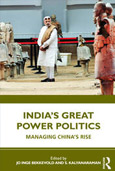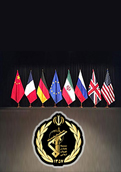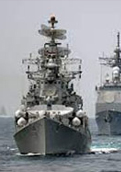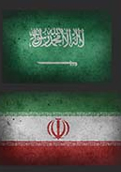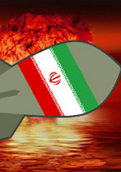Iran
Emerging India: Security and Foreign Policy Perspectives
Publishers: IDSA and Promilla & Co.
ISBN: 81-86019-51-0
Rs 795
US $ 30
India-Japan Relations: Partnership for Peace and Security in Asia
Publishers: Promilla & Co. and Bibliphile South Asia
ISBN: 81-85002-76-2
Rs. 295
US $ 14.95
India’s Great Power Politics
- Publisher: Routledge India
The book looks at the strategic importance of the Indian Ocean Region in the Indo-Pacific geopolitical landscape and how India is managing China’s rise by combining economic cooperation with a wide set of balancing strategies. The authors in this book critically analyse the various tools of Indian foreign policy, including defence posture, security alignments, and soft power diplomacy, among others, and discuss the future trajectory of India’s foreign policy and the factors which will determine the balance of power in the region and the potential risks involved.
The book provides detailed insights into the multifaceted and complex relationship between India and China and will be of great interest to researchers and students of international relations, Asian studies, political science, and economics. It will also be useful for policymakers, journalists, and think tanks interested in the India–China relationship.
- ISBN: 9781032045955 ,
- Price: ? 995.00
IRGC’s FTO Designation and JCPOA Revival
The JCPOA revival, to some extent, will continue to depend on the US’s stand on the IRGC’s designation.
- Harshit Sharma
- August 28, 2023
Iran-Arab Gulf Joint Naval Force and China’s ‘Collective Security Architecture’
China and Iran claim to be building a new security architecture for West Asia on the pretext of keeping out the “unjustified” presence of “foreign forces”.
- Adil Rasheed
- June 15, 2023
The Saudi–Iran Rapprochement
The Chinese-mediated rapprochement between Saudi Arabia and Iran puts a check on the widening gap between the two regional powers.
- Prasanta Kumar Pradhan
- March 14, 2023
Iran’s Strategic Behaviour Against ISIS: Religio-Cultural Context of Shrines and Martyrdom
The killing of Qassem Soleimani in 2020 again brought the religio-cultural significance of ‘martyrdom’ into limelight in Iran. He got recognized as the ‘Defender-Martyr of Holy Shrine’ given his role against ISIS in protecting the Shi’i holy shrines. This article analyses the relationship between ‘shrines and ‘martyrdom’ in Iran’s strategy against ISIS.
- Shafat Yousuf , Rafiullah Azmi
- January-February 2023
Iran Delinks Regional and Nuclear Diplomacy
Iran is focussing its diplomatic energies on advancing its ‘neighbourhood policy’ and long-term cooperation with China and Russia.
- Deepika Saraswat
- July 29, 2022
Iran’s Central Asia Policy Gains Momentum amid Russia–Ukraine War
Iran has seen a sudden rise in its importance as a transit and transport hub connecting China and Central Asia to Europe, and also Russia with India.
- Deepika Saraswat
- July 19, 2022





